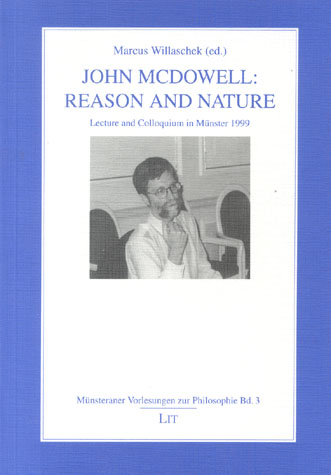평소에 맥도웰의 철학에는 '다원주의적' 함의가 들어 있다는 생각을 하고는 했습니다. 경험이 '이유의 논리적 공간'에 따라 이루어진다는 맥도웰의 주장이란, 쉽게 말해 경험이 우리의 '세계관'에 따라 이루어진다는 주장이고, 그 '세계관'이란 시대나 문화마다 다양할 수 있으니까요. 실제로, 맥도웰은 초기의 Mind and World를 비롯해서 후기의 Having the World in View에 이르기까지 '세계관'이라는 개념을 꽤나 강조합니다. 후기의 논문집 제목부터가 "'세계'를 '관점' 속에 가지기"라는 데서부터 이런 점이 잘 드러나죠.
하지만 정작 맥도웰의 논문들이나 맥도웰에 대한 다른 연구들에서는 '다원주의'가 거의 다루어지지 않아서 저의 이런 해석이 과연 올바른 것인지 항상 의문스러웠습니다. 맥도웰은 '실재론'이나 '선언주의'를 강조하는 철학자로 널리 알려져 있지만, '다원주의'를 강조하는 철학자로는 언급되지 않아서요. 심지어 '세계관'에 대한 논의도 잘 이루어지지 않는 것 같더라고요. 세계관을 강조하게 되면 당연하게도 다원주의까지 강조해야 할 것 같은데 말이에요.
그런데 오늘 이 주제로 본격적인 검색을 해 보니, 맥도웰의 1999년 뮌스터 강의록인 Reason and Nature에 이 주제에 대한 토론이 실려 있더라고요. 네덜란드 그로닝겐 대학교의 크리스토프 예단이 "Nature or Natures?: Notes on the Concept of Second Nature in John McDowell’s Mind and World"에서 맥도웰의 입장이 다원주의적이라는 점에 대해 비판적 의문을 제기하였고, 맥도웰은 그 의문에 대해 자신의 입장은 '제2의 자연'(이유의 논리적 공간에서 지각된 세계)의 다원성을 옹호하지만 그 다원성에는 아무런 문제도 없다는 주장을 하더라고요.
It seems that an Aristotelian concept of second nature might well allow for an irreducible plurality of ‘second natures’: Aristotle’s ethics seems to suggest that there might be not only one second nature or one design of human rationality. The crucial question is whether McDowell’s conception of second nature would lose some of its force if we could not assume that there was just one human second nature.
(Christoph Jedan, "Nature or Natures? Notes on the Concept of Second Nature in John McDowell’s Mind and World", Reason and Nature, Marcus Willaschek (ed.), LIT Verlag, 2000, p. 72)
Jedan says that ‘an Aristotelian concept of second nature might well allow for an irreducible plurality of “second natures” ’ (72). I think he is right about this, but wrong to think the point constitutes any difficulty for me. To focus on just one of the three aspects of Aristotelian ethics he considers: certainly a vice is just as much second nature to its possessors as a virtue. So what makes a virtue a virtue – a capacity to get things right in one’s conduct – cannot be the fact that it is second nature to its possessors. What makes it a virtue must be the specific content of the way of seeing situations as calling for action that constitutes it, which is divergent from any way of seeing situations as calling for action that constitutes a vice. Just so with what I suggest we can model on an Aristotelian conception of an ethical virtue, namely knowing one’s way around in the space of reasons. (In fact we can see an ethical virtue as a special case of that: knowing one’s way around in a particular region of the space of reasons.) The point of saying that such a capacity is second nature to its possessors is not to suggest that we can exploit the fact that the capacity is natural in order to entitle ourselves to the idea that its possessors get things right. As Jedan rightly says, a second nature of just this sort can show itself equally in people’s being wrong about what is a reason for what. The point of invoking second nature is only to insist that we need not accept an opposition between the idea of responsiveness to reasons and the idea of what is natural. Such an opposition would rule out the actualizations in sensibility, natural as that must be, of capacities belonging to spontaneity, reason-involving as that must be, that are needed for my way of avoiding the dilemma I begin with.
John McDowell, "Responses", Reason and Nature, p. 108.
맥도웰의 다원주의에 대해 브라질에서 출판된 논문도 있는 것 같지만, 포르투갈어로 쓰여 있다 보니 읽을 수가 없어서 아쉬웠습니다. 여하튼 평소에 막연하게 고민하던 주제에 대해 구체적인 텍스트 근거를 찾게 되니 뭔가 반갑더라고요.
